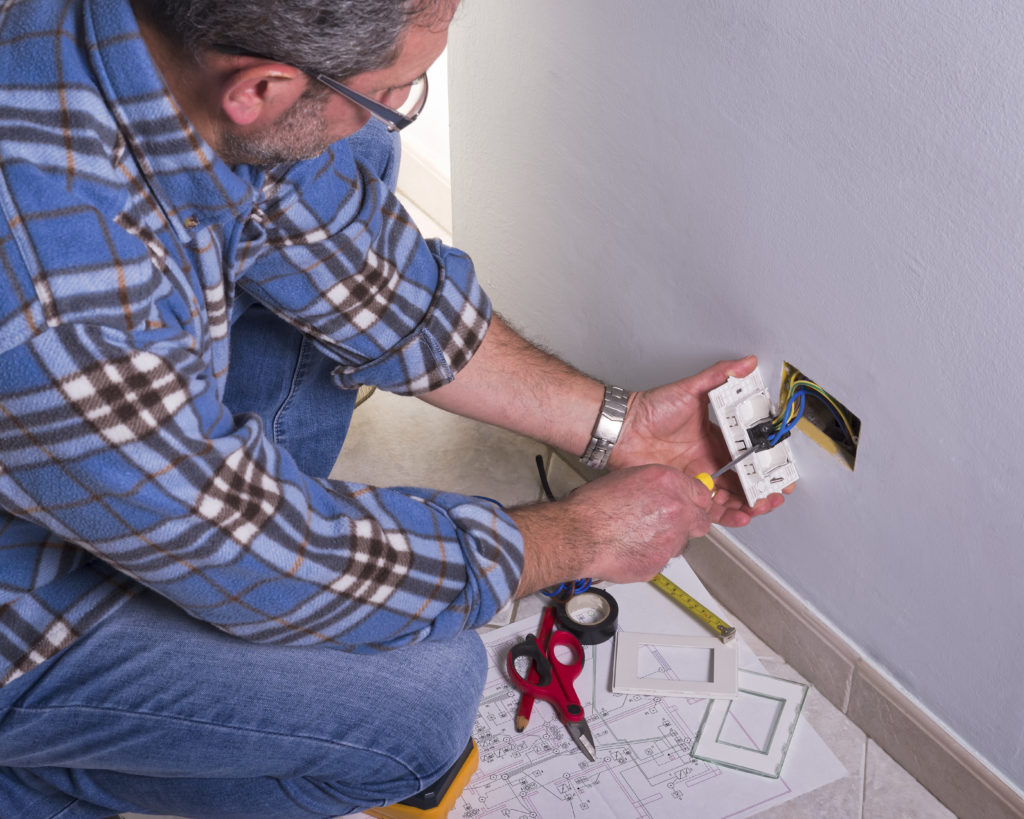
Baseboard heaters are a great way to heat your home and combat the cold. Installing them however can be a big pain, so we’re always looking for an easier way to wire them in.
You cannot wire a baseboard heater to an electrical outlet. Baseboard heaters draw between ten and twenty amps, while the average electrical outlet will only draw between fifteen and twenty amps. If you do this it will increase the chance of blowing the fuses or even catch fire.
How To Wire Baseboard Heaters
To properly wire a baseboard heater you need to hook it up to your fuse box. This is a big pain, but there is no safer way and it will be better in the long run.
Before you go attaching wires to your breaker box you need to first make sure that it is safe. To do this, first, turn off the main breaker in your box. After this, make sure all the circuits are dead by using a voltage tester on the hot wires (the ones coming out of the fuse boxes).
After it is safe you can continue onward.
Hooking the wires up to your fuse box will only require a positive and negative wire. A neutral wire isn’t necessary, though if you want the added security you can install one without too much fuss. 12 gauge wires will work perfectly for any heater running twenty amps or less.
You will need a twenty amp fuse box to wire into.
You need to make sure your wires are grounded before you make them live. So you need to first attach the ground wire to your breaker box. Then you can attach your other wires.
You then need to run the wire from your fuse box to your baseboard heater. This can be a pretty tricky feat, you may need to hire a professional. However, doing this while the drywall is off can make it much more accessible.
The wires will need to be wired into your baseboard thermostat eventually. But first, you need to mount your baseboard heater to the wall.
This may require the removal of some baseboard parts. This can be done by cutting the baseboard chunk you’re replacing straight off the wall, or by removing the whole section, cutting, then putting the now separate pieces back. Whatever you choose to do, remember to measure twice and cut once.
After you secure your heater to the wall, then route the wires through any holes in the back of the heater to get power to your thermostat.
Wiring your thermostat is pretty simple, but they all vary based on the particular make and model. Be sure to read the owner’s manual.
That’s how you properly wire a baseboard heater. No electrical outlets are needed. Now, here’s why you should not use an electrical outlet for wiring heaters.
Why Not Use An Electrical Outlet?
Wiring a baseboard heater to an electrical outlet would work okay if the only power draw was the heater. However, any given household circuit will have twenty amps or less, making a ten amp heater use half or more of the total amps on the entire circuit.
This would essentially render the circuit useless if you plug anything else in, causing the fuse to blow. You might ask “Why not just put a bigger fuse in?”
I’m gonna stop you right there. Putting a bigger fuse into your fuse box is a one-way ticket to a house fire. If you don’t believe me watch this video.
That’s what happens if you mess with your fuses. Fuses keep you safe by blowing when the amp draw gets too high for your wires.
Not to mention that wiring a baseboard heater into an electrical outlet is against building codes. Any heater needs at least six inches of clearance on all sides from any obstructions or electrical components.
Baseboard heaters aren’t even allowed to be close to outlets in modern buildings.
Okay, so big deal, it’ll be the only thing wired into the circuit. No biggie right? That’s a personal question. Keep in mind that a circuit will probably include lights as well. So not only would you not be able to use any other outlets on that circuit, but you might even have to keep your lights off that are on that circuit.
If after all those reasons you still choose to go ahead with wiring the baseboard heater into your electrical outlet, my condolences.
Other Options For Baseboard Heaters
Luckily there are more options than just baseboard heaters. The easiest would be a mobile space heater. These bad boys plug straight into the electrical outlet and can be pretty good at warming a closed place up.
These are great for individual rooms. Although the second a door opens, all that heat dissipates and you’ll need to wait for the room to warm back up.
To heat bigger, more open rooms you could consider a wall heater. These are basically baseboard heaters, but higher up on the wall. They are just as hard to put in, but they warm rooms better than space heaters.
They are normally not as powerful as baseboard heaters though.
You could also consider a radiator heater. It’s old-fashioned, but they work very well. They can be a little tricky to install though. It might be worth it if it keeps you warm though.

If you have the option, putting in a gas fireplace would be best. Gas heaters are far more economical than electric heaters and better at heating open rooms. This would be a lot more money upfront due to installation challenges, but it will pay itself off pretty quick though, and especially if you live in a cold climate.
Preventing Electrical Damage
As demonstrated in the video above, electricity is no laughing matter. Messing with wires requires at least a rudimentary understanding of gauges, fuses, and amps.
Basically, the smaller the gauge the more amps can run through the wire without fear of damage. Fuses should match or be lower than the amps of your wire.
Make sure that when you wire in your baseboard heater you do not exceed the total amperage allowed by your main breaker. This may be in your breaker box, but it would be best to search the public records. These can be found in your county tax assessor’s office, county recorder, and city hall. You may need to search them all.
Be safe when wiring. Electricity can cause a lot of damage if you’re not careful. So err on the side of caution and don’t bite off more than you can chew.
